Charles E W Bean, Diaries, AWM38 3DRL 606/104/1 - March - April 1918 - Part 7
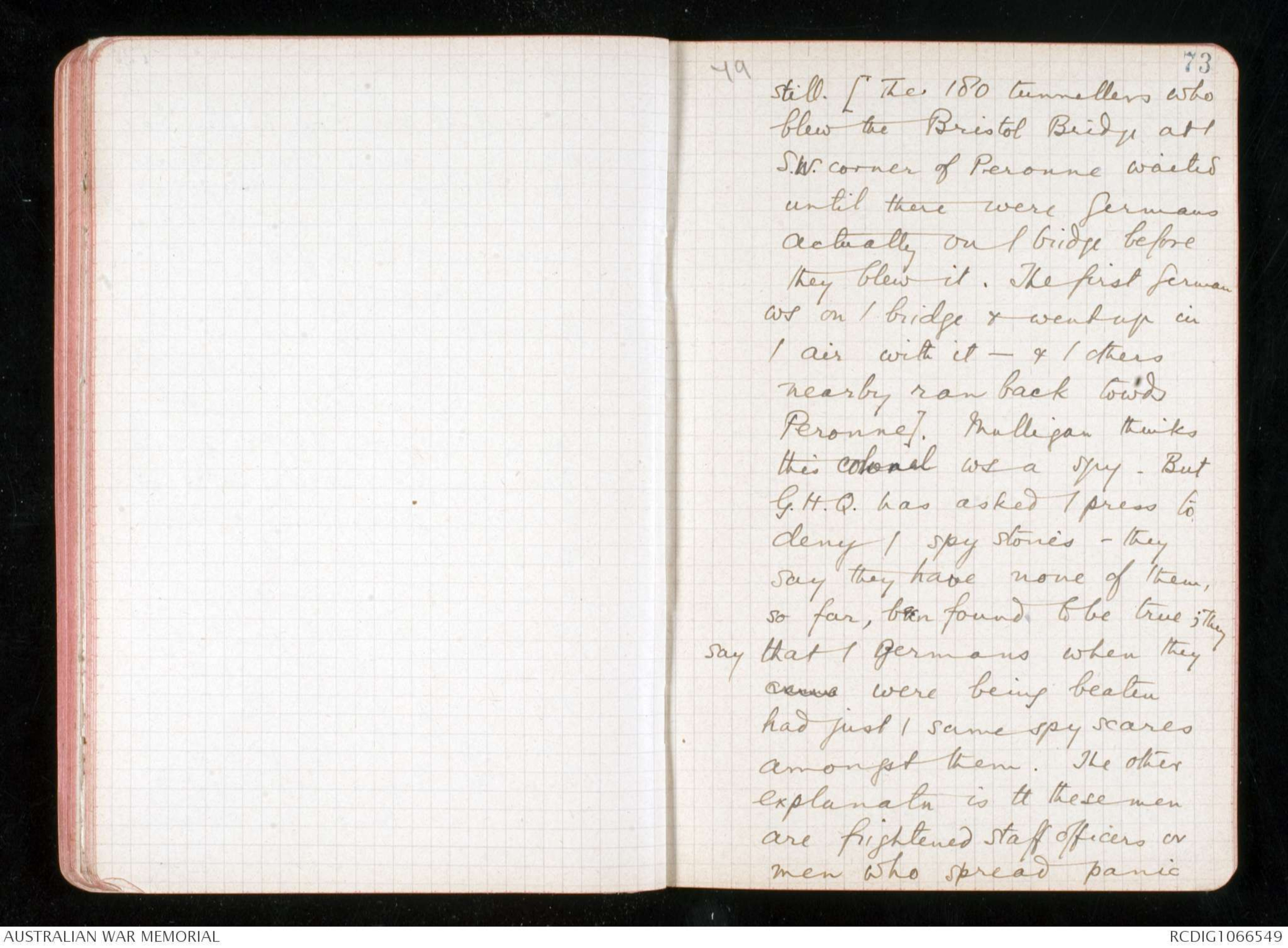
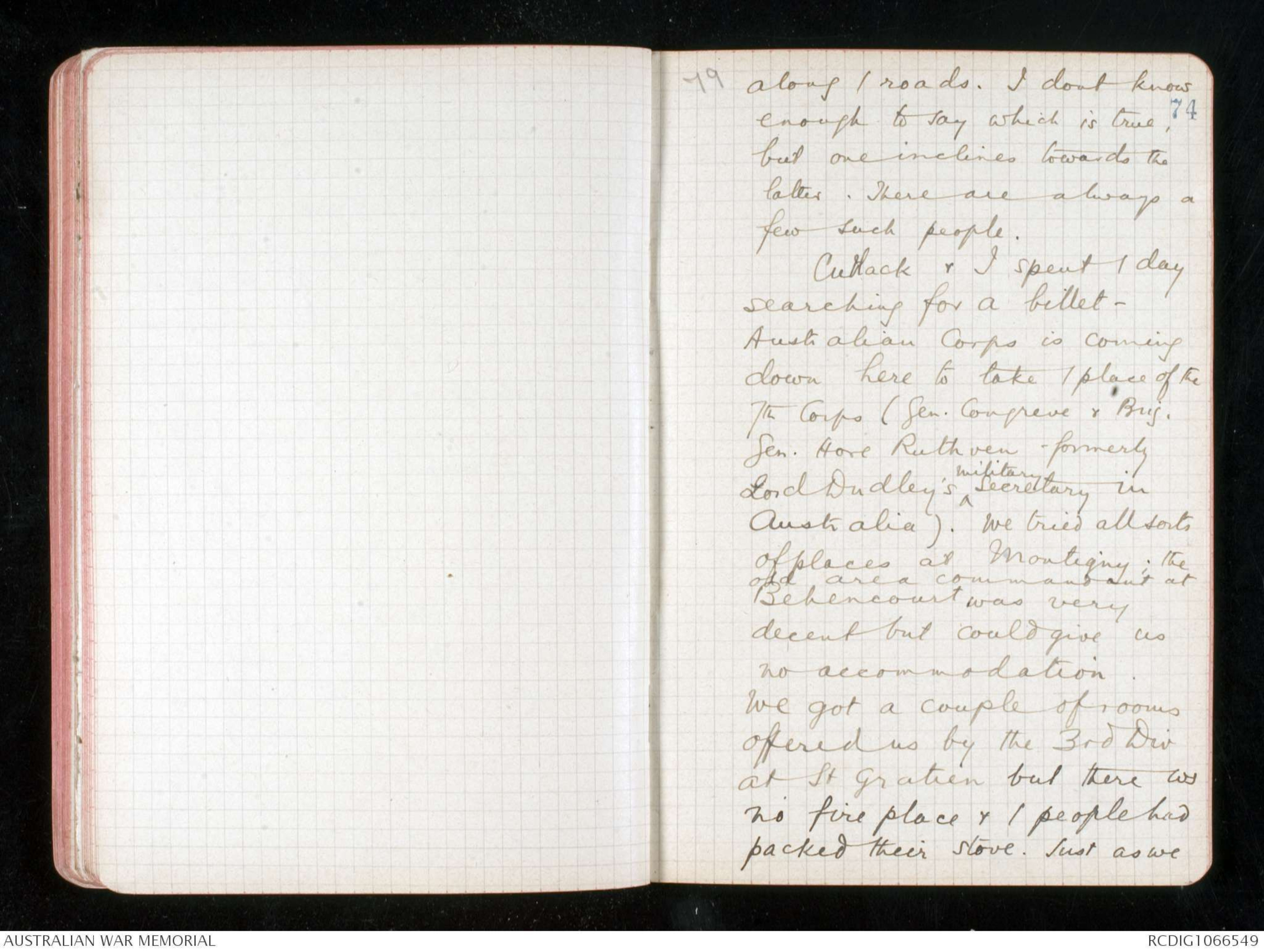
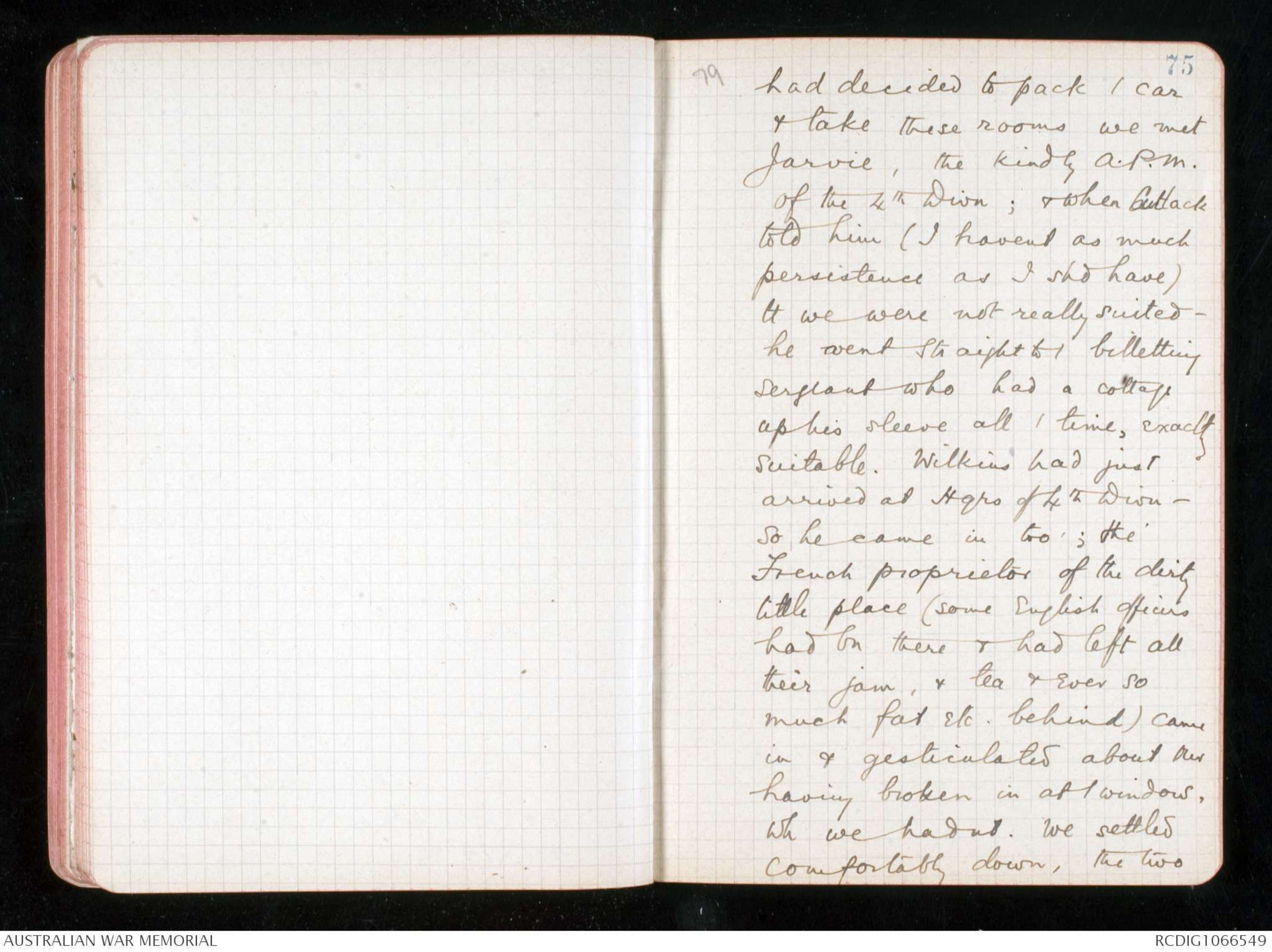
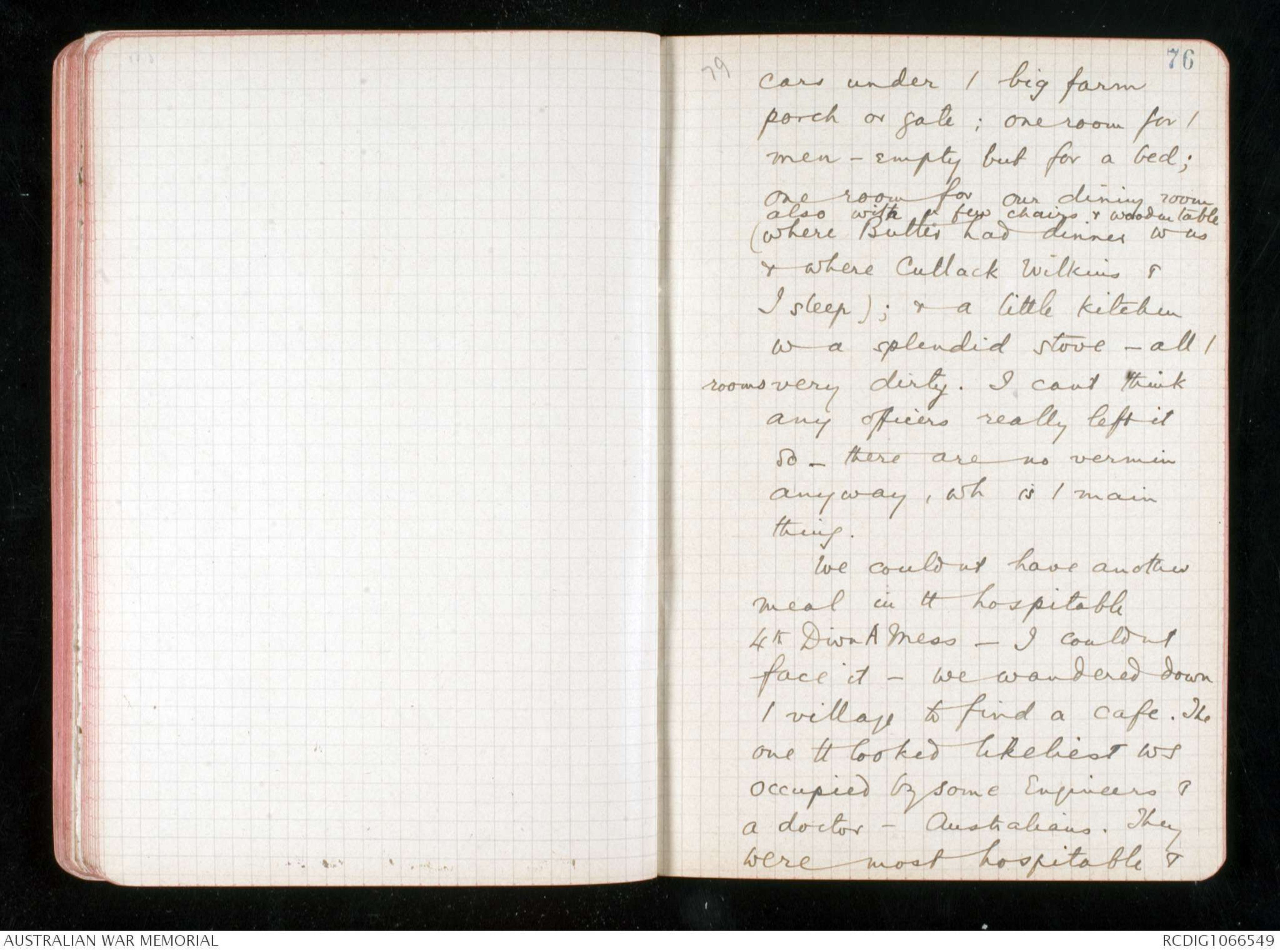
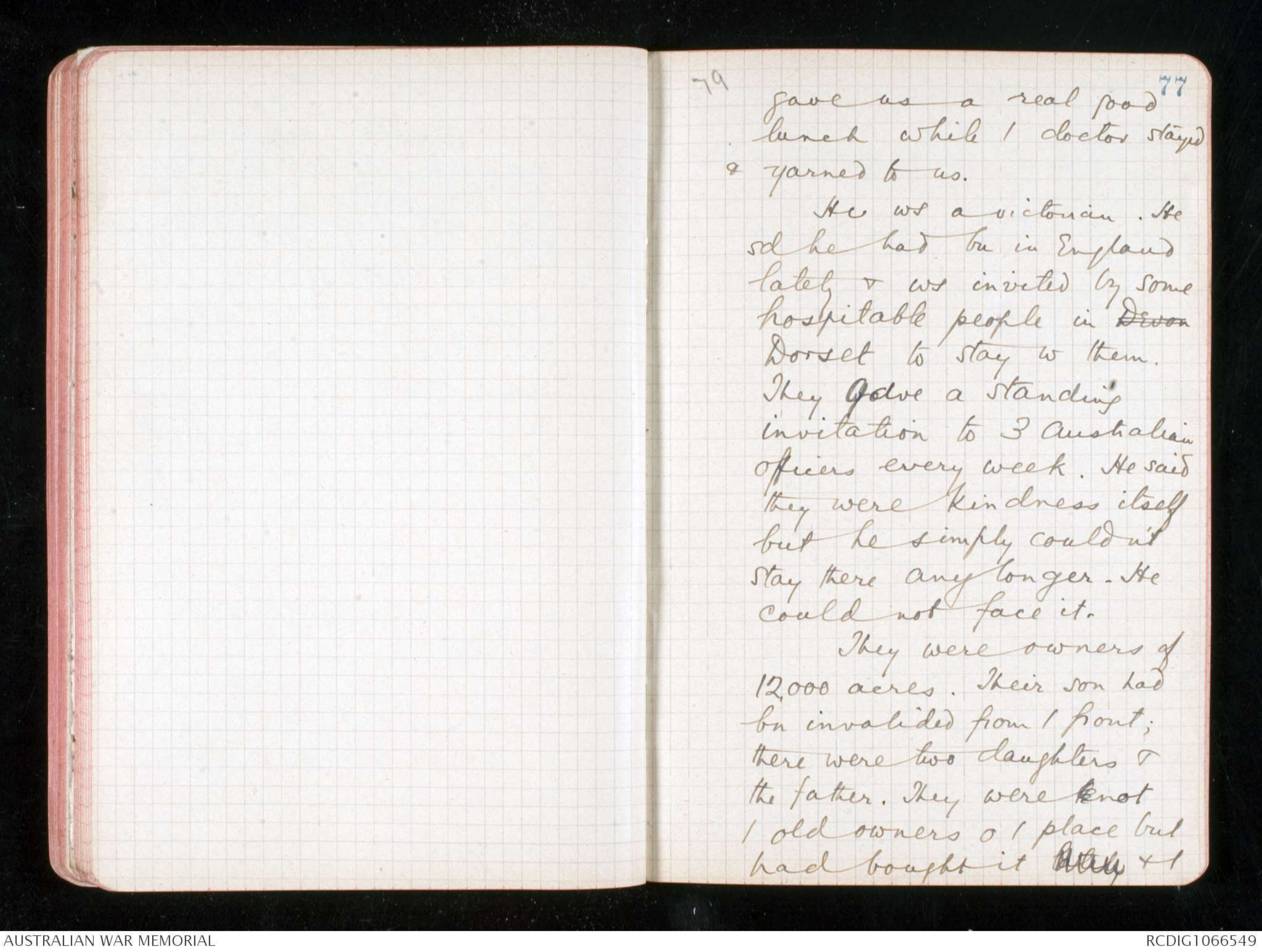
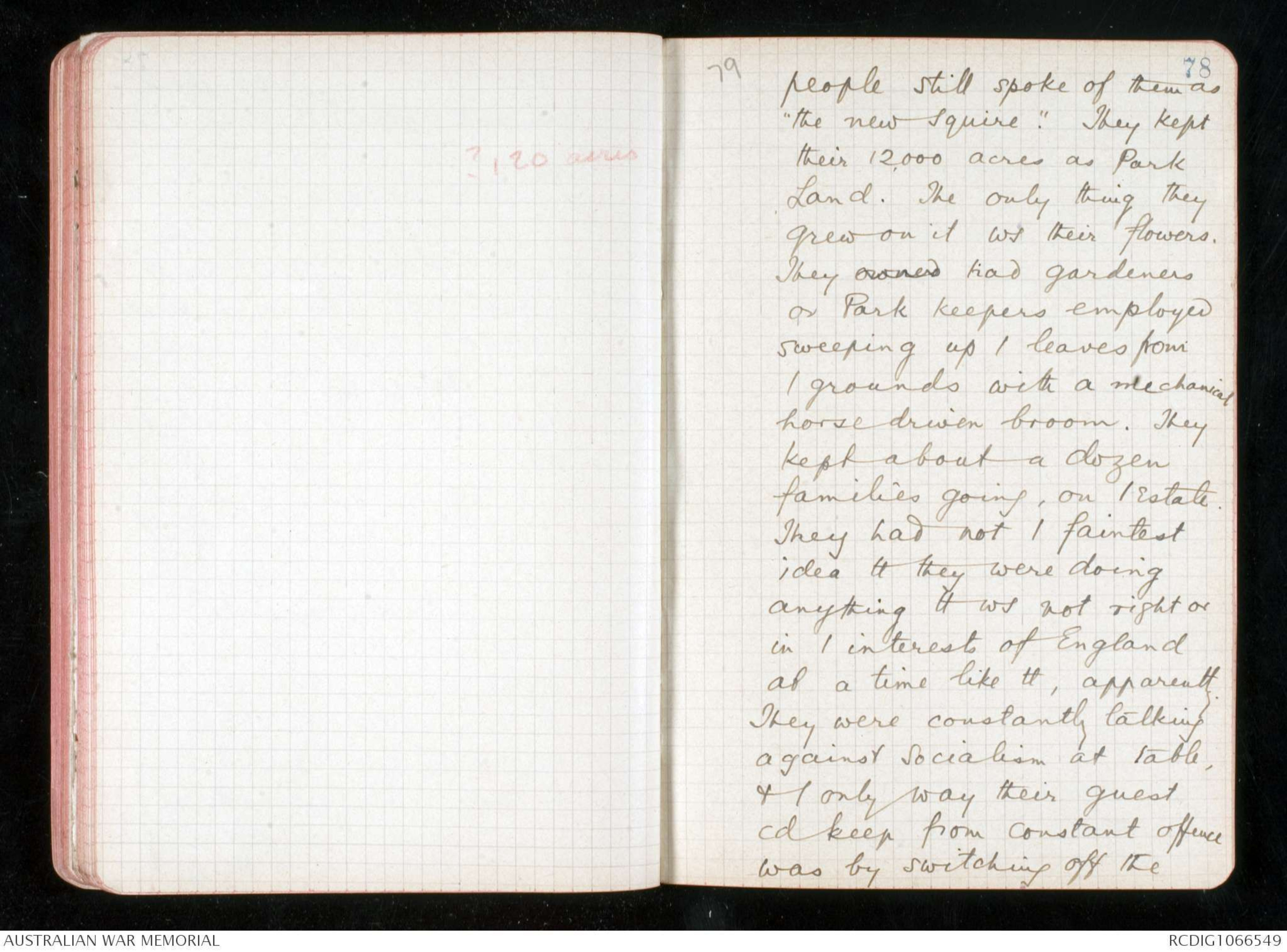
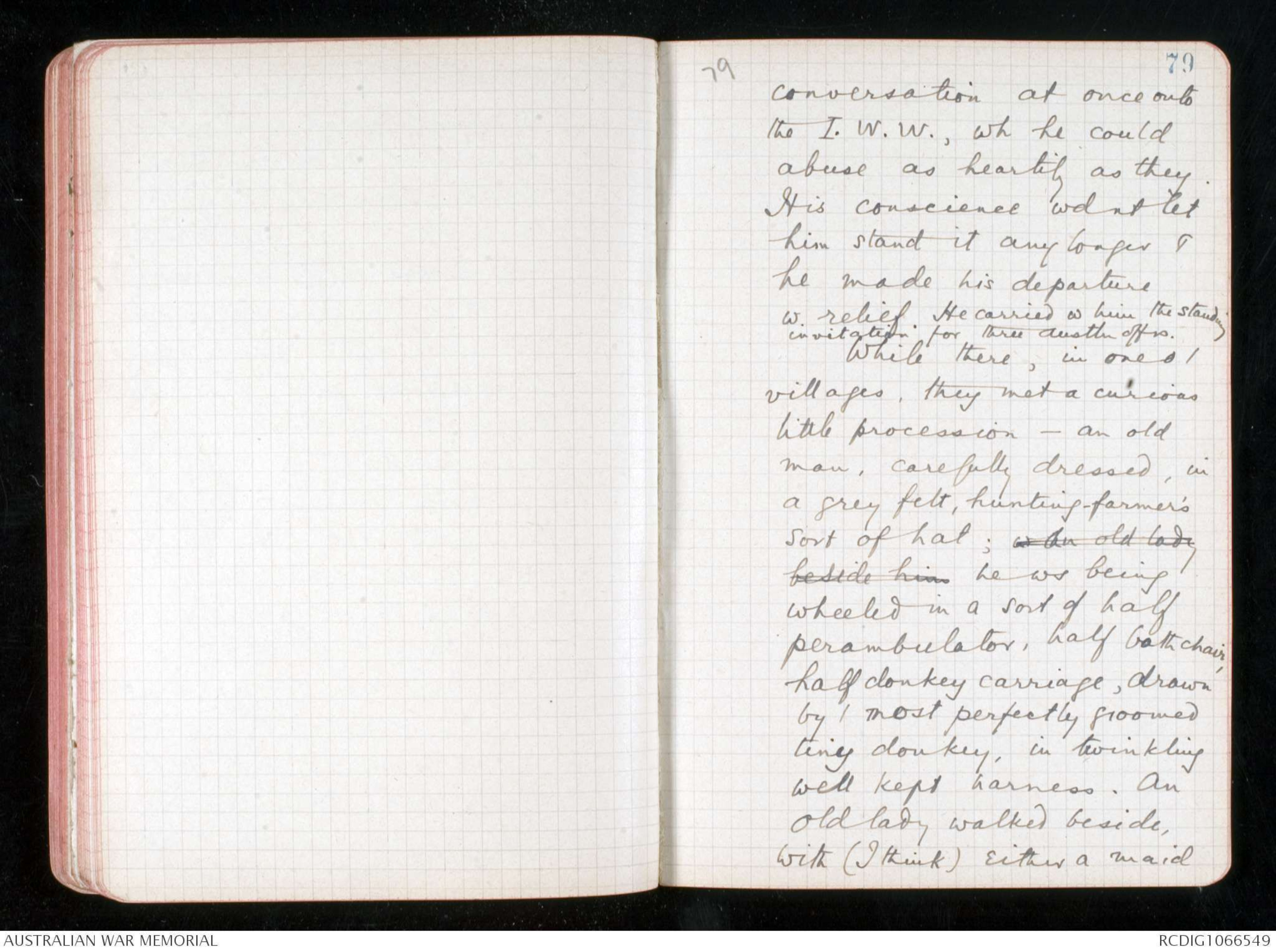
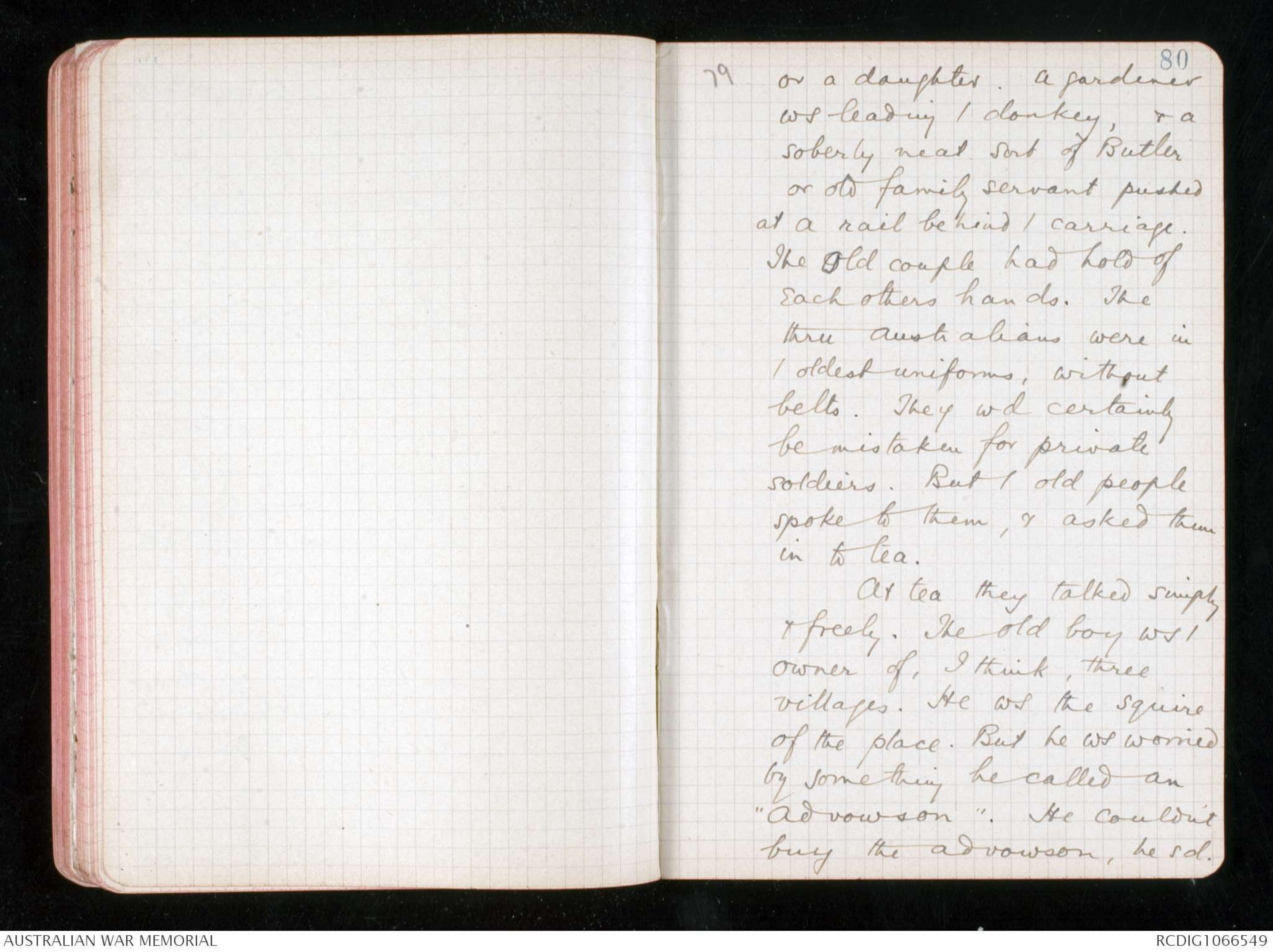
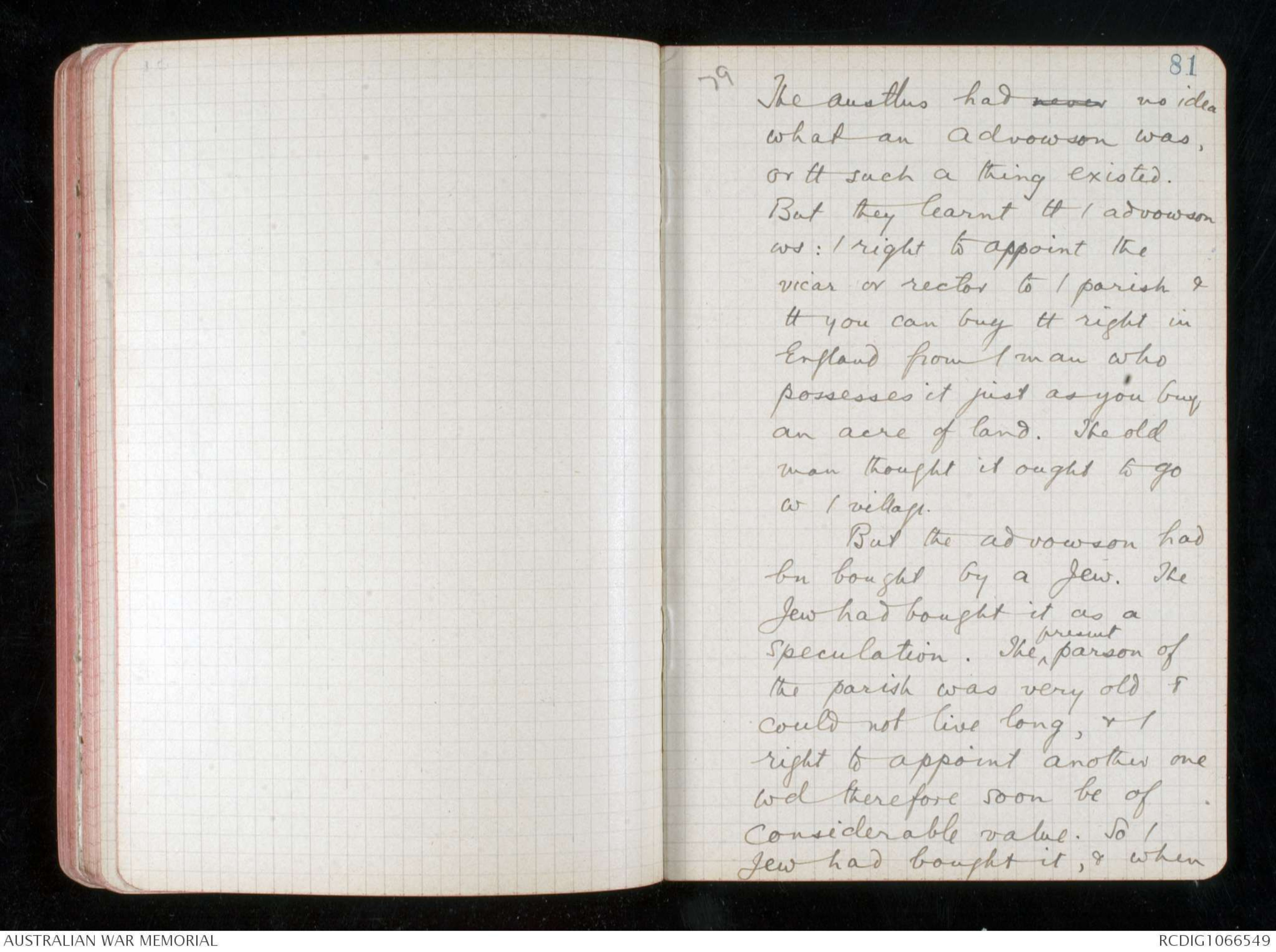
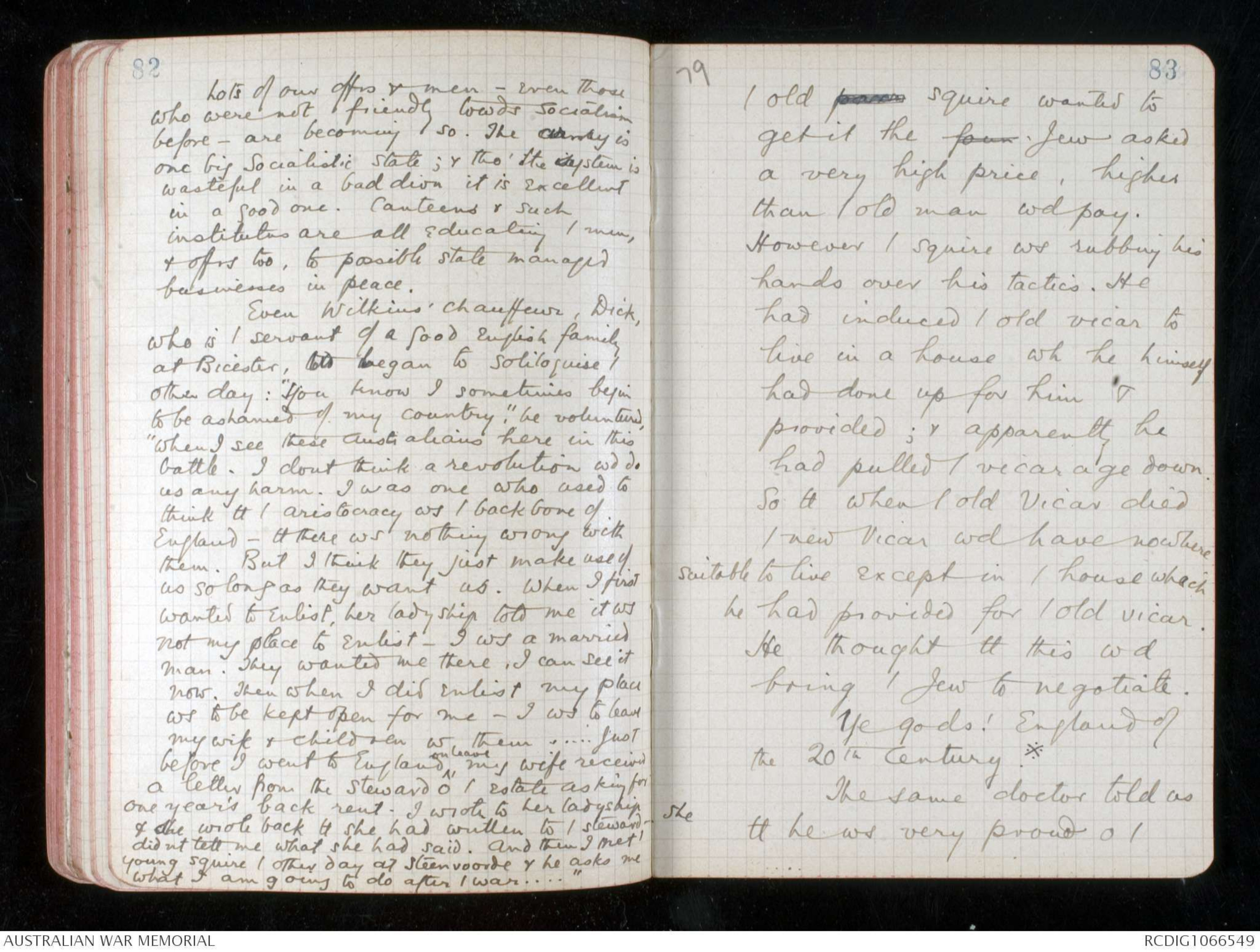
79 73
still. [The 180 tunnellers who
blew the Bristol Bridge at /
S.W. corner of Peronne waited
until there were Germans
actually on / bridge before
they blew it. The first German
ws on / bridge & went up in
/ air with it - & / others
nearby ran back towds
Peronne]. Mulligan thinks
this colonel ws a spy. But
G.H.Q. has asked / press to
deny / spy stories - they
say they have none of them,
so far, been found to be true; they
say that / Germans when theycame were being beaten
had just / same spy scares
amongst them. The other
explanatn is tt these men
are frightened staff officers or
men who spread panic
79 74
along / roads. I dont know
enough to say which is true,
but one inclines towards the
latter. There are always a
few such people.
Cutlack & I spent / day
searching for a billet -
Australian Corps is coming
down here to take / place of the
7th Corps (Gen. Congreve & Brig.
Gen. Hore Ruthven - formerly
Lord Dudley's ^Military Secretary in
Australia). We tried all sorts
of places at Montigny; the
old area commandant at
Behencourt was very
decent but could give us
no accommodation.
We got a couple of rooms
offered us by the 3rd Div
at St Gratien but there ws
no fireplace & / people had
packed their stove. Just as we
79 75
had decided to pack / car
& take these rooms we met
Jarvie, the kindly A.P.M.
of the 4th Divn; & when Cutlack
told him (I havent as much
persistence as I shd have)
tt we were not really suited -
he went straight to / billetting
Sergeant who had a cottage
up his sleeve all / time, exactly
suitable. Wilkins had just
arrived at Hqrs of 4th Divn -
so he came in too; the
French proprietor of the dirty
little place (some English officers
had bn there & had left all
their jam, & tea & ever so
much fat etc. behind) came
in & gesticulated about our
having broken in at / window,
wh we hadnt. We settled
comfortably down, the two
79 76
cars under / big farm
porch or gate; one room for /
men - empty but for a bed;
one room for our dining room
also with a few chairs & wooden table
(where Butler had dinner w us
& where Cutlack Wilkins &
I sleep); & a little kitchen
w a splendid stove - all /
rooms very dirty. I cant think
any officers really left it
so - there are no vermin
anyway, wh is / main thing.
We couldnt have another
meal in tt hospitable
4th Divn A Mess - I couldnt
face it - we wandered down
/ village to find a cafe. The
one tt looked likeliest ws
occupied by some Engineers &
a doctor - Australians. They
were most hospitable &
79 77
gave us a real good
lunch while / doctor stayed
& yarned to us.
He ws a Victorian. He
sd he had bn in England
lately & ws invited by some
hospitable people in Devon
Dorset to stay w them.
They gave a standing
invitation to 3 Australian
officers every week. He said
they were kindness itself
but he simply couldn't
stay there any longer. He
could not face it.
They were owners of
12,000 acres. Their son had
bn invalided from / front;
there were two daughters &
the father. They were knot
/ old owners o / place but
had bought it lately & /
? 120 acres
79 78
people still spoke of them as
"the new Squire". They kept
their 12,000 acres as Park
Land. The only thing they
grew on it ws their flowers.
They owned had gardeners
or Park keepers employed
sweeping up / leaves from
/ grounds with a mechanical
horse driven broom. They
kept about a dozen
families going, on / Estate.
They had not / faintest
idea tt they were doing
anything tt ws not right or
in / interest of England
at a time like tt, apparently.
They were constantly talking
against Socialism at table,
& / only way their guest
cd keep from constant offence
was by switching off the
79 79
conversation at once onto
the I.W.W., wh he could
abuse as heartily as they.
His conscience wdnt let
him stand it any longer &
he made his departure
w relief. He carried w him the standing
invitation for three Austln offrs.
While there, in one o /
villages, they met a curious
little procession - an old
man, carefully dressed, in
a grey felt, hunting-farmer's
sort of hat; w an old ladybeside him he ws being
wheeled in a sort of half
perambulator, half bath chair,
half donkey carriage, drawn
by / most perfectly groomed
tiny donkey, in twinkling
well kept harness. An
old lady walked beside,
with (I think) either a maid
79 80
or a daughter. A gardener
ws leading / donkey, & a
soberly neat sort of Butler
or old family servant pushed
at a rail behind / carriage.
The old couple had hold of
each others hands. The
three Australians were in
/ oldest uniforms, without
belts. They wd certainly
be mistaken for private
soldiers. But / old people
spoke to them, & asked them
in to tea.
At tea they talked simply
& freely. The old boy ws /
owner of, I think, three
villages. He ws the squire
of the place. But he ws worried
by something he called an
"Advowson". He couldn't
buy the advowson, he sd.
79 81
The Austlns had never no idea
what an Advowson was,
or tt such a thing existed.
But they learnt tt / advowson
ws: / right to appoint the
vicar or rector to / parish &
tt you can buy tt right in
England from / man who
possesses it just as you buy
an acre of land. The old
man thought it ought to go
w / village.
But the advowson had
bn bought by a Jew. The
Jew had bought it as a
speculation. The ^present parson of
the parish was very old &
could not live long, & /
right to appoint another one
wd therefore soon be of
considerable value. So /
Jew had bought it, & when
82
Lots of our offrs & men - even those
who were not friendly towds Socialism
before - are becoming so. The Army is
one big Socialistic state; & tho' the system is
wasteful in a bad divn it is excellent
in a good one. Canteens & such
institutns are all educating / men,
& offrs too, to possible state managed
businesses in peace.
Even Wilkins' chauffeur, Dick,
who is / servant of a Good English family
at Bicester, told began to soliloquise /
other day: "You know I sometimes begin
to be ashamed of my country", he volunteered,
"When I see these Australians here in this
battle. I dont think a revolution wd do
us any harm. I was one who used to
think tt / aristocracy ws / backbone of
England - tt there ws nothing wrong with
them. But I think they just make use of
us so long as they want us. When I first
wanted to Enlist, her ladyship told me it ws
not my place to Enlist - I ws a married
man. They wanted me there, I can see it
now. Then when I did enlist my place
ws to be kept open for me - I ws to leave
my wife & children w them ..... Just
before I went to England ^on leave my wife received
a letter from the steward o / Estate asking for
one year's back rent. I wrote to her ladyship
& she wrote back tt she had written to / steward - She
didnt tell me what she had said. And then I met /
young squire / the other day at Steenvoorde & he asks me
what I am going to do after / war ...."
79 83
/ old pan squire wanted to
get it the foun. Jew asked
a very high price, higher
than / old man wd pay.
However / squire ws rubbing his
hands over his tactics. He
had induced / old vicar to
live in a house wh he himself
had done up for him &
provided; & apparently he
had pulled / vicarage down.
So tt when / old Vicar died
/ new Vicar wd have nowhere
suitable to live except in / house which
he had provided for / old vicar.
He thought tt this wd
bring / Jew to negotiate.
Ye Gods! England of
the 20th Century. :x:
The same doctor told us
tt he ws very proud o /
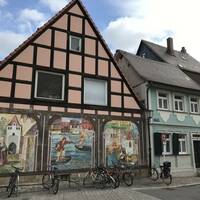 Robyn G
Robyn GThis transcription item is now locked to you for editing. To release the lock either Save your changes or Cancel.
This lock will be automatically released after 60 minutes of inactivity.